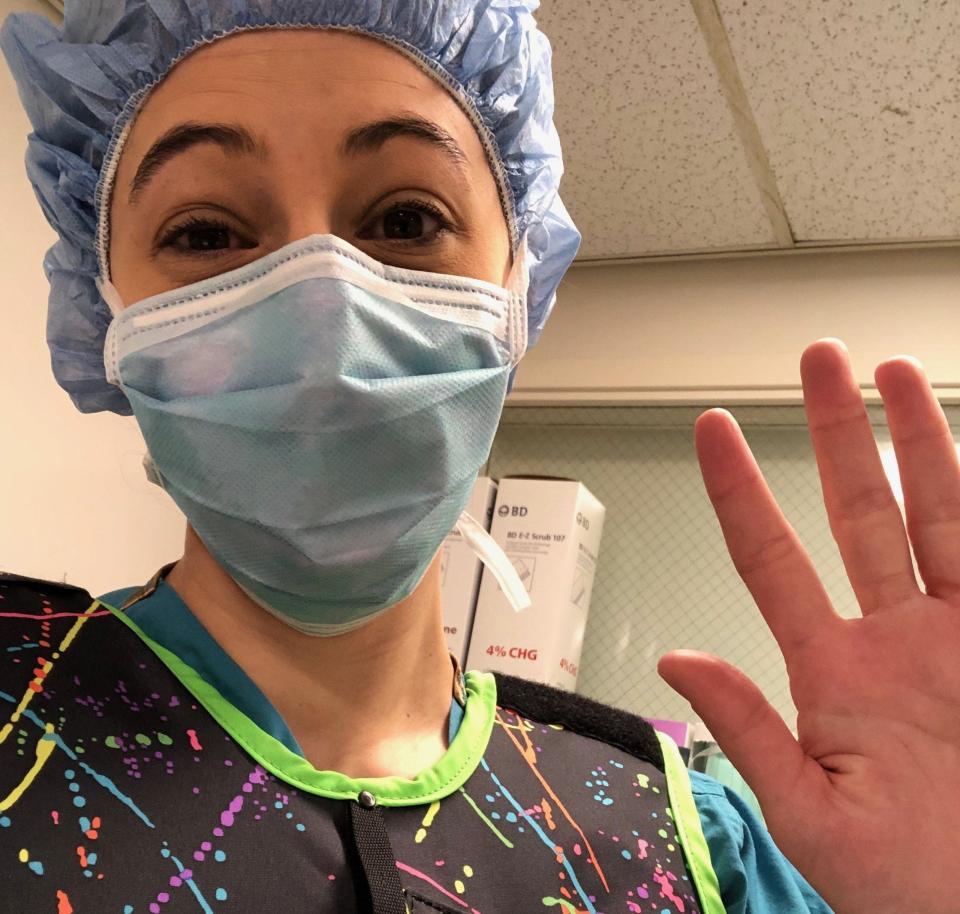I'm a physician assistant on furlough when I could be helping coronavirus patients
As Americans prepare for the expected peak of COVID-19 cases later this spring, it is easy to read the news about hospitals being stretched to the limit and think this country lacks qualified health care professionals to treat the virus.
The truth is exactly the opposite. New York Gov. Andrew Cuomo signed an executive order April 7 to allow graduating medical students to begin practicing now. This is becoming a trend as states are asking thousands of retired health care workers — and even unlicensed medical students — to answer their call to help reinforce systems in crisis. At the same time, we have many qualified health care professionals capable of treating COVID-19 who are unable to do so. The problem is that hospitals are not paying them.
I am a board-certified physician assistant. PAs are trained to handle the symptoms arising from COVID-19 that you would typically see in the emergency room, the floor of a hospital or an intensive care unit. Many of my peers, people I went to school with and work in my industry, are facing furloughs, shortened hours or layoffs.
Furloughed during COVID-19 crisis
To the detriment of both patients and providers, it turns out that lifesaving care for critical illnesses like the coronavirus will not keep the lights on at hospitals. They are quickly burning through cash reserves and will need continuous bailouts by the government to remain operational through the pandemic.
Chronic illness: Don't delay care for chronic illness over coronavirus. It's bad for you and for hospitals.
I’ve worked in private practice for a clinic in central New Jersey since graduating with my Master of Science in physician assistant from Virginia's Radford University, formerly Jefferson College of Health Sciences. There are over 130,000 PAs, according to the American Academy of Physician Assistants, and the Labor Department expects it to be one of the fastest-growing industries in America. We are trained specifically as medical generalists to foster career flexibility. Our training allows us to switch specialties, so our skill set is uniquely helpful when unexpected need threatens to overwhelm health care systems.

I could be on the front line right now fighting America’s invisible enemy. Instead, I was told March 31 that I would be on an unpaid leave of absence through June 30, and I was given no assurances that my job would still be there on that date. I have a newborn baby at home and have no idea when my next paycheck will come. And I’m not alone. This is a problem from coast to coast, and it applies similarly to the nation's nearly 300,000 nurse practitioners, who are equally capable providers.
Why is this happening?
According to the Centers for Disease Control and Prevention's analysis of preliminary data, 45% of all hospitalizations and over half (53%) of intensive care admissions are for people ages 65 and older. As coronavirus spreads, the number of Medicare beneficiaries admitted to the hospital for COVID-19 related symptoms is expected to rise. There is a relatively low reimbursement rate of Medicare to hospital systems.
Hotline: Share your coronavirus story
Last month, Surgeon General Jerome Adams issued guidance urging health care systems to consider stopping elective procedures until we get coronavirus under control. While this decision is understandable, people don’t realize the downstream effects of such a policy. Health systems generate most of their revenue from elective procedures — studies have shown that they account for more than 75% of the operating profit of health care systems. It's now clear that these procedures are needed for administrators to meet payroll for workers who can treat COVID-19.
Don't sideline us during a historic crisis
With that in mind, hospitals need a bailout with a directive to train and employ PAs and nurse practitioners in necessary positions to account for the surge in need.
Also, 36 states place ratio restrictions on PAs, stipulating that they must practice under the supervision of physicians, often at a 4-to-1 ratio. At least six states have eased restrictions on PA supervision to help fight COVID-19, and 13 had already done so before the outbreak. This should be extended nationwide through executive order. PAs have extensive generalist medical training and an understanding of limits that require physician collaboration. This ensures that they will continue to seek guidance when necessary, while relieving strict supervisory requirements that only serve to delay PA credentialing and patient care.
A few weeks to ramp up tests: End the coronavirus outbreak with aggressive screening to find and isolate infected people
Additionally, we need policy solutions to pay for the staffing of our overrun hospitals. This would work better than asking undertrained medical students without life insurance policies, or retired physicians who could be at higher risk of contracting the virus themselves, to fill in. As noble as it is for these people to step up, it is free labor from the wrong people.
This is the dilemma facing our health care system. The system of fee for service is failing patients and sidelining health care workers during a once-in-a-lifetime public health emergency.
Jamie Goldstone is a physician assistant for a private clinic in Red Bank, New Jersey, where she has worked since 2017 after her graduation from Radford University, formerly Jefferson College of Health Sciences, in Virginia with a Master of Science in 2016. She was furloughed by her employer on March 31 with a tentative return date at the end of June.
You can read diverse opinions from our Board of Contributors and other writers on the Opinion front page, on Twitter @usatodayopinion and in our daily Opinion newsletter. To respond to a column, submit a comment to letters@usatoday.com.
This article originally appeared on USA TODAY: I can help coronavirus patients but I'm furloughed: Physician assistant

